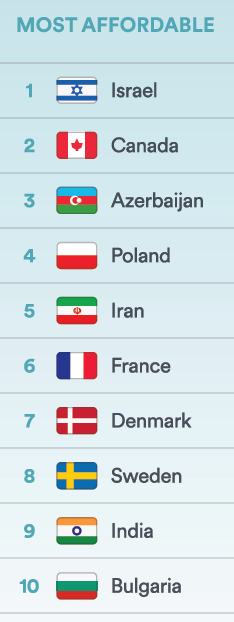 Surfshark, a provider of online privacy and security solutions, has produced a study examining the quality of a digital wellbeing in 85 countries representing 81% of the global population.
Surfshark, a provider of online privacy and security solutions, has produced a study examining the quality of a digital wellbeing in 85 countries representing 81% of the global population.
The Surfshark Digital Quality of Life Index is based on five “fundamental pillars”: Internet affordability; Internet quality; Electronic infrastructure; Electronic security; and, Electronic government.
Canada (.78 index) ranked 3rd out of the 85 countries examined, behind Denmark (.79) and Sweden (.79), with its overall ranking brought down by only ‘moderate’ data protection laws.
Canada’s broadband affordability ranked first in the world, with the index looking at how much time on average needed to be worked to afford the lowest price plans.
Overall internet affordability, which included mobile broadband, placed Canada in second place, behind Israel. Surfshark’s ranking is consistent with the Inclusive Internet Index ranking by the Economist’s Intelligence Unit, placing Canada’s internet affordability in third place of 100 countries examined, based on cost relative to income and competitive environment.
And recall that a report by PwC released a little over a year ago showed “Canadian mobile services top G7 affordability ranking”.
So why do we keep hearing these deeply flawed statements like, “everybody knows Canada has some of the most expensive internet access prices in the world?”
While such statements may create eye-catching headlines, it is not a proper reflection of reality.
With so many important Canadian telecom policy issues under consideration, it is critical that discussions are based on the evidence. The Surfshark index, like the Economist’s Inclusive Internet Index and PwC’s study, all demonstrate that on average, Canadian telecom services are affordable.
As I said at the time of the PwC study last year, “there are indeed some Canadians unable to find an affordable device or service plan that they may need to participate in today’s economy.”
That needs to start with developing a greater understanding of those individuals and households on the wrong side of the digital divide and focus programs to target those inequities.
But it is long past the time to leave behind the flawed populist narrative on overall affordability of Canadian telecom services.

Thank you Mark for digging into benchmark and studies from different providers. Do believe the data from Surfshark makes sense? An average Canadian, making ~$16/hr, needs to work 7 min to afford either the cheapest broadband package or 1GB of mobile internet.